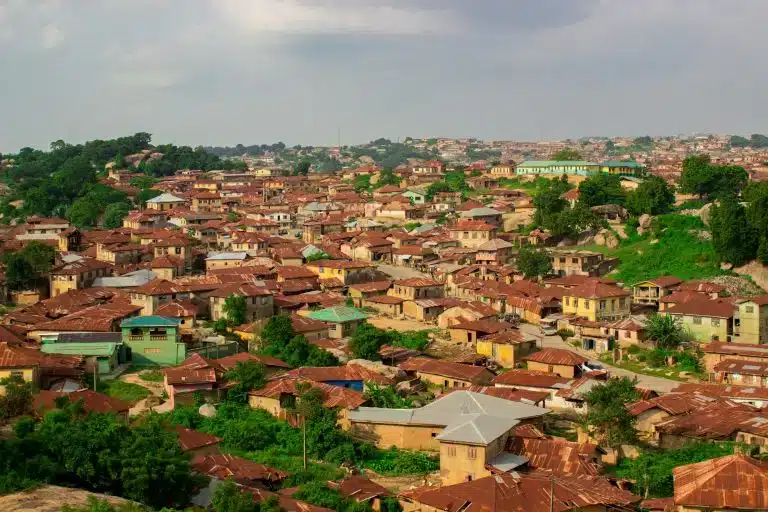Nigeria, often called the “Giant of Africa,” is the most populous country on the continent and home to booming cities, vibrant culture, and a growing expat workforce. With economic centers like Lagos, Abuja, and Port Harcourt, the country presents promising opportunities for professionals, entrepreneurs, and digital nomads. But before making the move, it’s important to understand the actual cost of living in Nigeria and how it varies by state.
How affordable is life in Nigeria?
The overall cost of living in Nigeria depends greatly on where you settle. States like Lagos and Abuja are considerably more expensive than Enugu, Kano, or Ibadan. While Nigeria is generally cheaper than most European countries, price fluctuations, unstable infrastructure, and inflation make careful budgeting essential. Moreover, due to currency volatility, the Nigerian naira (₦) can change quickly in relation to the euro (€) and US dollar (USD).
As of 2025, the average exchange rate is:
- €1 ≈ ₦920
- $1 ≈ ₦850
Key Takeaways:
- Cost of living varies widely by state.
- Lagos and Abuja are the most expensive.
- Earnings in EUR or USD are more stable due to naira volatility.
Housing and utilities: big gaps between states
Accommodation costs in Nigeria can vary dramatically. In Lagos, renting a one-bedroom apartment in the city center (Victoria Island or Lekki) can cost ₦600,000 to ₦1,200,000/month (€650–€1,300 or $705–$1,410). The same apartment in Ibadan or Enugu might only cost ₦250,000 to ₦400,000/month (€270–€435). In Abuja, upscale districts like Maitama or Asokoro are similarly priced to Lagos.
Utility costs, especially for electricity, are often unpredictable. Frequent power outages mean many homes require generators. Monthly bills including electricity, water, gas, and internet range from ₦40,000 to ₦80,000 (€45–€90 / $47–$95). Generator fuel and maintenance add another ₦20,000–₦60,000 depending on use and region.
Summary:
- Lagos & Abuja: ₦600K–₦1.2M/month for 1-bedroom apartments.
- Smaller cities (e.g. Enugu, Ibadan): ₦250K–₦400K/month.
- Utilities: ₦40K–₦80K/month + extra for generator costs.
Food prices in Nigeria: local vs imported goods
Groceries are affordable when shopping locally. A basic monthly food budget for one person ranges from ₦100,000 to ₦200,000 (€110–€220 / $118–$235). However, expats who rely on imported goods or international supermarkets will see their bills rise, especially in Lagos or Abuja.
Dining out is cost-effective in most states. In Kano or Enugu, a local dish might cost only ₦800 (€0.90 / $1). In more upscale Lagos restaurants, meals typically range between ₦4,000 and ₦10,000 (€4.50–€11 / $5–$12). Fine dining or hotel restaurants can easily surpass ₦15,000.
Recap:
- Local groceries: ₦100K–₦200K/month.
- Street food meals: ₦800–₦2,500.
- Mid-range restaurants: ₦4,000–₦10,000.
- Upscale dining: ₦15,000+.

Transportation costs: public vs private
Transportation in Nigeria is generally cheap, but comfort and safety vary. Public buses and shared taxis are available in all states but are often crowded and poorly maintained. Many expats prefer ride-hailing services like Bolt or Uber, especially in Lagos and Abuja. A short trip costs around ₦800 (€0.90 / $1) and increases with distance or traffic.
Car ownership is common among middle- and upper-class Nigerians and expats. Petrol is ₦650 per litre (€0.70 / $0.76), and yearly insurance ranges from ₦100,000 to ₦400,000 depending on the car model.
Quick Overview:
- Ride-hailing services: ₦800+ per trip.
- Public transport: ₦200–₦500 per ride.
- Petrol: ₦650/litre.
- Car insurance: ₦100K–₦400K/year.
Healthcare: public services vs private clinics
Healthcare quality varies dramatically across states. Public hospitals are affordable but often lack resources. In Kano, Enugu, or Ibadan, public consultation fees are as low as ₦2,000–₦5,000. However, expats usually opt for private clinics in Lagos, Abuja, or Port Harcourt, which offer better services and shorter wait times.
Private consultations cost ₦15,000 to ₦40,000 (€16–€45 / $18–$50). For long-term stays, expats typically purchase health insurance, with premiums between ₦50,000 and ₦150,000 per month (€55–€165 / $60–$175).
At a Glance:
- Public consultation: ₦2,000–₦5,000.
- Private consultation: ₦15,000–₦40,000.
- Monthly health insurance: ₦50K–₦150K.

Education costs for Expats
While public education in Nigeria is largely free, it’s not recommended for expat children. International schools are concentrated in Lagos, Abuja, and Port Harcourt, offering British, American, or IB curricula. Annual tuition fees range between ₦2,000,000 and ₦6,000,000 (€2,200–€6,600 / $2,350–$7,000).
Private universities are available in various states, with tuition ranging from ₦1,500,000 to ₦3,500,000 per semester (€1,650–€3,850 / $1,750–$4,100).
Key Points:
- International school tuition: ₦2M–₦6M/year.
- Private university (semester): ₦1.5M–₦3.5M.
Living cost comparison: Nigeria vs Europe
| Cost Category | Nigeria (₦ / € / $) | Europe (avg. in €) |
| Rent (1-bedroom, city center) | ₦600K–₦1.2M (€650–€1,300 / $705–$1,410) | €1,000–€2,000 |
| Groceries (monthly) | ₦100K–₦200K (€110–€220 / $118–$235) | €300–€500 |
| Transportation (monthly) | ₦30K–₦60K (€35–€65 / $40–$70) | €80–€150 |
| Health insurance (monthly) | ₦50K–₦150K (€55–€165 / $60–$175) | €100–€250 |
Additional factors to consider
- Regional Cost Differences:
Lagos and Abuja are costlier than cities like Enugu or Ibadan. Rural states offer even cheaper living, but with fewer services and amenities. - Currency Volatility:
The naira regularly loses value against the euro and dollar. If you’re earning in USD or EUR, your purchasing power increases but budgeting in naira is challenging. - Security & Infrastructure:
Costs can rise for those who require 24/7 security, constant generator power, or live in gated estates. - Residency & Visas:
Expect to pay ₦50,000 to ₦300,000 per year for visa renewals, work permits, or residency documents. - Entertainment & Leisure:
From beaches in Lagos to hiking trails in Jos or music festivals in Calabar, leisure costs are affordable and region-specific.
Final thoughts
Nigeria is a land of contrasts affordable and vibrant, yet affected by infrastructure challenges and inflation. While Lagos and Abuja cater more to business professionals and high-income expats, states like Ibadan, Kano, or Enugu offer simpler, cheaper alternatives.
Whether you’re a freelancer, diplomat, or corporate expat, understanding regional price differences, currency risks, and local services is crucial. If you’re earning in dollars or euros, your budget will stretch further but smart planning is key.
